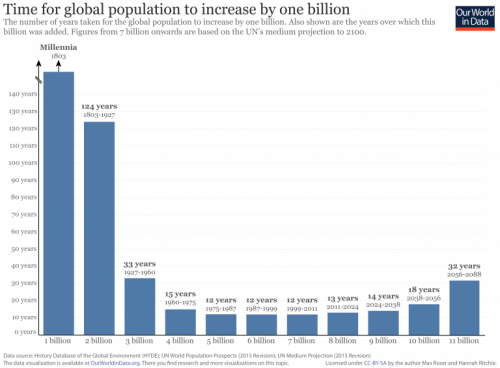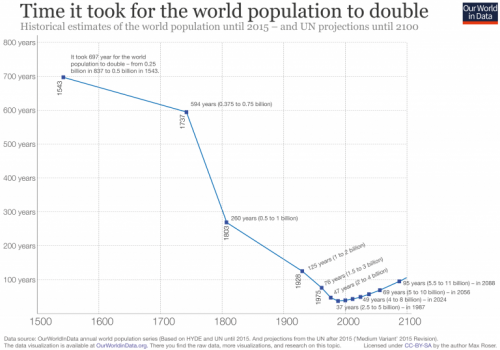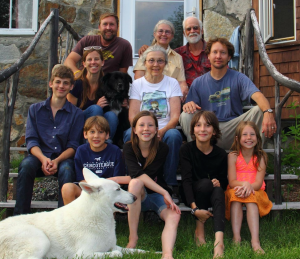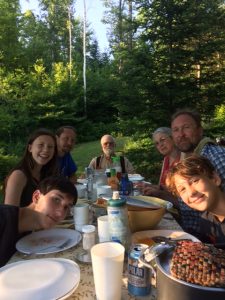My posting day coincides with World Population Day this week .
We’ll look at the connection between population trends and poverty, explore the call for family planning — this year’s theme — and meet members of my personal contribution to the world’s population (who will be going home tomorrow).
Three themes, one post. Can I keep it under 1,000 words? Let’s see.
 World Population Day 11 July
World Population Day 11 July
Population trends and poverty
I’m pulling from the UN’s UNFPA page, Population and Poverty. Here’s what I thought was the critical paragraph.
Access to sexual and reproductive health, including family planning, can affect population dynamics through voluntary fertility reduction and reductions in infant and maternal mortality.
Improved reproductive health also helps individuals, particularly young women, break out of intergenerational cycles of poverty.
When women and couples are empowered to plan whether and when to have children, women are better enabled to complete their education; women’s autonomy within their households is increased; and their earning power is improved.
This strengthens their economic security and well-being and that of their families. Cumulatively, this contributes to development progress and poverty reduction.
Did you know that the population growth rate topped off at 2.2% back in 1963 and has been declining since? I didn’t.
The second surprise I found has to do with how they measure such things. Our World In Data (dot org) was a wealth of information.
The one I found easiest to grasp (both visually and cognitively) was the how-long-does-it take-to-add-1-billion new people graph.
Yes, billion; B as in Boy that’s a lot of people.

It wasn’t until 1803 that the world reached its first billion; it then took another 124 years to reach two billion. By the third billion, this period had reduced to 33 years, reduced further to 15 years to reach four. The period of fastest growth occurred through 1975 to 2011, taking only 12 years to increase by one billion for the 5th, 6th and 7th.
Things are looking up though. If we can maintain the slower rate of growth, the period between each billion is expected to continue to increase so that by 2088, it’ll take a full 32 years to add the 11th billion — a long generation.
The other way has to do with how many years it’ll take to double the current population.

The fastest doubling of the world population happened between 1950 and 1987: a doubling from 2.5 to 5 billion people in just 37 years — the population doubled within a little more than one generation.
No wonder we baby boomers have grown up with a sense of the world spinning fast.
It’s starting, ever so slowly, to take longer for the population to double. The word is spreading. And, family planning has also been spreading.
Which may be why the 2018 theme for World Population Day is
Family Planning is a Human Right
This year marks the 50th anniversary of the 1968 International Conference on Human Rights, where family planning was, for the first time, globally affirmed to be a human right.
The conference’s outcome document, known as the Teheran Proclamation, stated unequivocally: “Parents have a basic human right to determine freely and responsibly the number and spacing of their children.”
Embedded in this legislative language was a game-changing realization: Women and girls have the right to avoid the exhaustion, depletion and danger of too many pregnancies, too close together. Men and women have the right to choose when and how often to embrace parenthood — if at all. Every individual has the human right to determine the direction and scope of his or her future in this fundamental way.
[learn_more caption=”Nine standards to uphold the human right to family planning:”] Non-discrimination: Family planning information and services cannot be restricted on the basis of race, sex, language, religion, political affiliation, national origin, age, economic status, place of residence, disability status, marital status, sexual orientation or gender identity.Available: Countries must ensure that family planning commodities and services are accessible to everyone.
Accessible: Countries must ensure that family planning commodities and services are accessible to everyone.
Acceptable: Contraceptive services and information must be provided in a dignified manner, respecting both modern medical ethics and the cultures of those being accommodated.
Good quality: Family planning information must be clearly communicated and scientifically accurate.
Informed decision-making: Every person must be empowered to make reproductive choices with full autonomy, free of pressure, coercion or misrepresentation.
Privacy and confidentiality: All individuals must enjoy the right to privacy when seeking family planning information and services.
Participation: Countries have an obligation to ensure the active and informed participation of individuals in decisions that affect them, including health issues.
Accountability: Health systems, education systems, leaders and policymakers must be accountable to the people they serve in all efforts to realize the human right to family planning.[/learn_more]
My Contribution

My firstborn was conceived on the hottest day of the year. He was very much wanted, once I learned he was on the way, but more interesting to me, given the heat that day, he was evidently quite determined to get here.
My second son followed at the then-appropriately-spaced three-year interval. He too, was much wanted but he’s more of the que sera, sera type. “My turn to be born?” I can hear him say. “Sure; why not?” (I always loved how different my two boys were: same gene pool, very different temperaments).

I’ve learned much from my sons over the years and I’m sure I’ll learn even more as life goes on. For that I am grateful. They came with their challenges as all children do, but they were wanted.
Isn’t that the birthright of all children, to be wanted? Certainly to be loved, cared for, nurtured, and then allowed (encouraged even) to fly so that, hopefully, they can come back for those eagerly anticipated visits.
And then go home again. It’s a cultural thing. (more on this next week)
How about you?

Clive
I totally agree that family planning is a human right, but sadly there are many who don’t – some of them in positions of power. We tried for several years before our first one came along, and there is a more than five year gap between our daughters. More a case of hoping than planning for us! I respect anyone’s wish not to have children – but I think they’re missing out. And we shouldn’t lose sight of those who would love to have children but can’t – population statistics are no consolation to them, are they?
Clive recently posted…69 Months Later
Janet Givens
Good points all, Clive. Thanks for starting us off.
Janet Givens recently posted…World Population Day: What’s Your Take?
Merril Smith
Good morning, Janet! Well, you know my views. And my older daughter is the founder of the Repeal Hyde Art Project. Both my pregnancies were planned after years of using birth control, and they were both very much wanted.
Well, you know my views. And my older daughter is the founder of the Repeal Hyde Art Project. Both my pregnancies were planned after years of using birth control, and they were both very much wanted.
I won’t use your blog to rant about the current administration and its policies aimed at eliminating reproductive rights, services, and information.
Merril Smith recently posted…Stardust and Blood
Janet Givens
I too had two intentionally — one for each hand was how I looked at it.
I hadn’t heard of the Repeal Hyde Art Project before, so of course had to google it. Here’s the link for others interested
http://www.repealhydeartproject.org/
Thanks for your contributions here each week, Merril.
Janet Givens recently posted…World Population Day: What’s Your Take?
Ally Bean
I was unaware of “the 1968 International Conference on Human Rights, where family planning was, for the first time, globally affirmed to be a human right.” I’m all for it, but had no idea that family planning was considered a human right.
I’m child-free but my arrival was a *surprise,* so I have personal experience on both sides of the family planning issue. Acknowledging a woman’s right to choose seems obvious to me. Would that others understood this reality better.
Ally Bean recently posted…Trashapalooza: Living Large With Two Paper Shredders
Janet Givens
Hi Ally. I’m afraid this basic right (of a woman to choose what is to be done with her body) — and once criminalized for medical reasons — has now become the purview of morality and religion, pushed there by politics.
I’ve been trying to find a poli sci text I once had that walked us through the process the “Right” used to make abortion the issue to rally the troops around. It’s a compelling read, but I’m thinking it went out with my downsizing before Peace Corps. Abortion as a partisan issue has certainly evolved. Even the Catholic Church once held that “quickening” — as determined by the woman herself — was the point at which abortion was no longer viable. It’s a fascinating history, certainly. We used to argue over life after death; now we’re debating life before birth. Human beings are filled with mystery to me.
Thanks for adding your voice.
Janet Givens recently posted…World Population Day: What’s Your Take?
Laurie Buchanan
Janet — I absolutely, utterly, completely, and totally agree that the birthright of every human being should be TO BE WANTED, LOVED, CARED FOR, AND NURTURED.
(P.S. I’m going to be a first-time grandparent in September and I can hardly wait).
Laurie Buchanan recently posted…Official Pub Day
Janet Givens
How wonderful for you Laurie. Every grandmother I’ve met (including me) all claim the experience is far better than they even imagined it would be. See what you have to look forward to?? I hope you’ll be closer than the 600 miles I have between mine and me.
Janet Givens recently posted…World Population Day: What’s Your Take?
Bette Stevens
With you all the way, Janet!
Janet Givens
Hi Bette. Thank you.
Janet Givens recently posted…World Population Day: What’s Your Take?
Marian Beaman
Thank you for an instructive post once again. I had the sense that the population was increasing exponentially, simply because of the world population now registers 7.4 billion people.
I definitely believe in family planning. Our firstborn came 2 ½ years after we married and had purchased a house. The second was a surprise, still welcomed, but sooner than we had planned. (Birth control pills work better than the rhythm method, I might add here.)
As to the current controversy, I can see many sides to the issue, and I’m not about to demean or judge those who take an opposing viewpoint. Advanced ultrasound shows that what was once thought a blob of protoplasm is a living thing. Thus, I oppose abortion in general, except in special cases like rape or incest. Women with an unwanted pregnancy still have options, one of them adoption by a family who longs for children and can care for them lovingly.
The photo is sweet. Sasha definitely counts as a member of the family!
Janet Givens
Hi Marian. Well, the population is still growing at an awfully fast rate — but the rate is slowing. That’s the only good news for this very finite planet. Personally, I don’t relish the thought of my descendants moving to Mars.
What’s always interesting to me about the abortion debate is that both sides are on the side of life. Life rules; who would disagree with that? But my first introduction to abortion was the death of a classmate from a self-induced abortion. After that, I began to notice all the other deaths from illegal abortions (pre 1973 obviously). Then I began to notice how the white, wealthy pregnant girls simply traveled elsewhere to get their abortion. It was those with no means to travel who were being hurt by a law that was initially put in place because abortions were once not safe. But medicine advances. Those reasons no longer were warranted.
Is it murder? Is it death? When does life begin? Which life is more important? Which life matters? (Frankly, I envision a future where the world is appalled at how we raise and eat meat). The determination of when life begins got a rather dramatic overhaul at some point when a batch of white men decided abortion was a hot topic to bring the Right together. Is it when the baby first smiled (as Aristotle claimed?). Is it when the baby breathes on its own for the first time? Is it when the mother begins to feel the fetus move? Is it at conception? What happens to all those potential human beings who lose their chance for life because the mother and father got together on Monday rather than Tuesday? The questions can get really mired down. And each of us must find the answer we can live with.
And, understand where the information they use to make that choice comes from. It’s not easy. Is it simple? I’m not sure anymore.
We’ve gotten a bit off track from World Population Day. Still, I thank you for being steadfast here.
Janet Givens recently posted…World Population Day: What’s Your Take?
Marian Beaman
Janet, I just saw a comment on the Proud Progressive Facebook page from a nun no less, Sister Joan Chittister. I can’t link it here, but you may want to look it up. She contrasts pro-life with pro-birth . . . interesting.
The Roe v. Wade decision made abortion a federal issue. I wonder if the topic would be less inflammatory now if the decision had been left to individual states.
Marian Beaman recently posted…Come to Bible School Every Evening of the Week
Janet Givens
My mind went immediately to Connecticut when you mentioned having states make these decisions. Did you know in CT is was a criminal offense for a married woman (or anyone for that matter) to buy birth control prior to the late ‘60s? It was the Supreme Court striking down that state law on the grounds of privacy that led the way to Roe v Wade a few years later. People in this country have a constitutional right to privacy, to not have the State (at any level) deciding what can go on in one’s bedroom. That is what is slowly being eroded — by men I quickly add, old, white men for the most part. It’s a throwback to the old “barefoot and pregnant” days — easiest way to control a woman is to keep her pregnant. And unable to walk away.
I love those Sister Chichester memes, but thanks for introducing me to the Proud Progressive. I’d not heard of it before.
Janet Givens recently posted…World Population Day: What’s Your Take?
An Historian
Its not the only reason but it is one of the major reasons I don’t want too have children- the world can’t support it’s current population. Even at the current rate of growth, we’ve hugely outstripped our resources, and the carbon footprint of each human is no small issue. I know that a lot of people judge me harshly but I am comfortable with my decision!
Janet Givens
I’m sorry some are judging you harshly. I actually know many couples who consciously have chosen not to have children of their own. Our circle quite admires them. I do wonder about their later years, though — certainly no reason to have children — yet, I do. Joy, wonder, play and laughter come from many sources. Children are just one path. I trust you’ve found yours.
Janet Givens recently posted…World Population Day: What’s Your Take?
Amelia
We have two sons and while sometimes I Lon for a third child, I can think of way too many reasons to not go for it… one of them being that I personally don’t believe in having more children than will “replace” you. That said, I have friends with more than two… one with nine! While I don’t agree with it, I also don’t think those people would ever have been in a position where any of this would have been particularly made clear to them either. We have a long way to go to educate people, and yes, that includes supporting family planning initiatives as a basic human right.
Janet Givens
We do have a long trek ahead of us. And we no longer (often) have health education classes in schools where it would fit into the curriculum quite nicely (IMHO). My thought was one for each hand, (in case of that impending disaster I once awaited) so I was set at two. Nine! Sounds simply exhausting.
Janet Givens recently posted…World Population Day: What’s Your Take?
Tim Fearnside
Beautiful family, Janet :). This post brings to mind research I’ve done on my family’s history, looking back at records of births in the late 1700’s and 1800’s, when it wasn’t uncommon to see descendants with 8, 10, or 12 children. Imagine what our population would be like today, without the advent of effective contraception and the notion of family planning. Regardless of one’s views on abortion, it seems we should largely be able to all agree that these are good and vital things for the advancement of women and girls, and the survival and sustainability of our planet and its rapidly depleting resources.
Janet Givens
Hi Tim, Welcome back.
Oh yes indeed, I know about those large families: my maternal great-grandmother was the baby of ten. I’m quite glad they had large families back then. And, you know what? I have this weird belief that even if that family had stopped at nine (or three), I’d still be OK. I’d still be. Go figure.
And, you know what? I have this weird belief that even if that family had stopped at nine (or three), I’d still be OK. I’d still be. Go figure.
Such a personal, private matter for women and girls and to think these decisions are almost always made by men, … white men, … old white men to boot. Get a bunch of fertile females at the table, then I’ll revisit my stance. AND, I must quickly add, these are also private decisions between the couple, so those men are welcome. As long as they are there in a supportive role, not a domineering one. I’m quite particular.
Thanks for joining in.
Janet Givens recently posted…World Population Day: What’s Your Take?
Kate Pill
Janet – A wonderfully thought-provoking post as always. I hadn’t realised that the world’s population had started to slow. Makes sense once pointed out. We have 3 children, all very much wanted, with each being very different. They have certainly brought much to our lives, although having said that, I firmly believe it is up to the individual whether they have children or not. The points you share about the impact of repeated pregnancies (not by “choice” but by a lack of access to birth control and other types of support) on women’s bodies and their resultant access to education are very interesting and provide a compelling argument for access to birth control information. I’m not applying that last thought to people in Developed countries who choose to have large families, but rather to people for whom it is not such a choice. Once again – a great read
Janet Givens
Hi Kate,
I know; I just love the stuff I learn putting these posts together.
Thanks for stopping.
Janet Givens recently posted…World Population Day: What’s Your Take?
susan scott
Hi Janet, a bit late to the population party! I remember as a young woman in my late 20’s thinking I wouldn’t have children – for the reason of over population. But I also remember seeing a baby in a pram when I was out walking and felt a twisting somewhere in my gut and knew that I did – so for me the biological instinct was real. I also believe that ‘creation’ can take many forms for those who choose not to have children whether it be in art in all its forms, baking, sewing etc. My two sons are 5 years apart and I thank God every day for them.
It is overly idealistic and unrealistic for me to say that women can say no and avoid pregnancy that way. The reality is far different. Education is required at school and family level and the facts presented. Too many live in dire poverty and the cycle is repeated.
susan scott recently posted…International Nelson Mandela Day
Janet Givens
Hi Susan. You reminded me that I too once believed I’d not have kids. But in nursing school (just one year; I’m actually now quite dangerous) I took a course in child psych with Lee Salk (the brother of Jonas, of polio vaccine fame) and got so animated and eager to test out all these great (and easy!!!) sounding theories for myself, I was eager to have kids. I read all the right books for the time and just knew (Hah!) I’d be the best mom ever. Did you read “the Magic Years?” I was all set to let my four-year-old take the vacuum cleaner apart after reading that one! I did rather well, actually, until they hit adolescence. My books hadn’t covered adolescents. Bummer. I was lost. Literally. So education, indeed. Of all sorts.
Janet Givens recently posted…What Is Family?